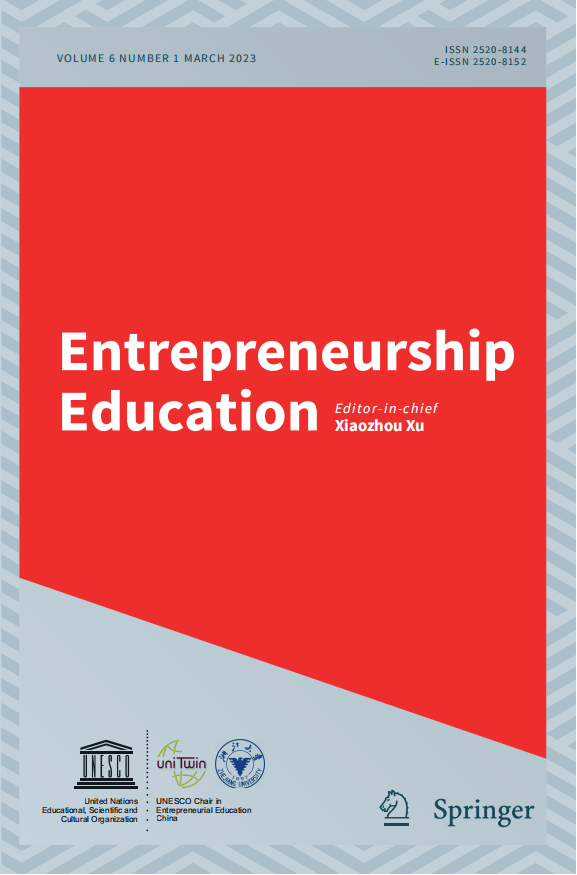部门:569vip威尼斯登录首页办公网 日期:2023-05-17 16:38:32 访问次数:10次
Entrepreneurship Education
《创业教育》
Volume 6, Issue 1

This journal is the first English academic journal concerning entrepreneurship education in the Asia Pacific region. It is jointly founded by UNESCO Chair in Entrepreneurship Education at Zhejiang University and Springer.
Original Research Articles
How can entrepreneurial interventions in a university context impact the entrepreneurial intention of their students?
David Bozward, Matthew Rogers-Draycott, Cynthia Angba, Carol Zhang, Hongyu Ma, Fulin An, Federico Topolansky, Luca Sabia, Robin Bell & Emily Beaumont
Abstract
This paper explores the link between the entrepreneurial intention of students in higher education and the entrepreneurial interventions an institution can provide to support them. The study uses data collected from 679 undergraduate students from Chinese and UK Universities. The instrument for data collection was a paper-based questionnaire. This study uses the integrated model of entrepreneurial intentions as the theoretical underpinning for this approach. The initial findings highlight the perceived need for a range of entrepreneurship interventions, with business training programmes being the highest priority, followed by mentoring, specialist business advice, low-cost finance, business networking events and enterprise clubs. It also shows that those with different Intention Horizons do request a different portfolio of interventions. The paper provides an evidence-based approach to entrepreneurship education design and the development of interventions to support a range of students with and without entrepreneurial intention. This work suggests a previously under-articulated relationship between the nascent entrepreneur’s Intention Horizon, university interventions, and entrepreneurial action. There are numerous calls for further contextualisation of entrepreneurship education which this paper fulfils (Baron and Shane in Psychol Entrepreneurship 19-39, 2007; Byrne et al. in Edward Elgar Publishing, 2014). It further develops the narrative around both contextualisation, the previous experience of the students and the range and importance of these interventions to support the creation of a new venture.
Planning and evaluating youth entrepreneurship education programs in schools: a systematic literature review
Jingjing Lin, Jiayin Qin, Thomas Lyons & Tomoki Sekiguchi
Abstract
Despite its importance, entrepreneurship education in upper secondary education is significantly less researched than in higher education. Many entrepreneurship education review studies are conducted at the university level, while relatively few are conducted at the high school level. Existing reviews favored discussing programs’ impacts and outcomes over its designing, developing, and delivering. Adapting well-established processes described in multiple entrepreneurship education reviews, we systematically identified and synthesized thirty-year literature on entrepreneurship education in upper secondary schools using academic database search, expert consulting, and backward snowballing techniques. Results led to the development of the Youth Entrepreneurship Education Planning and Evaluation (or YEEPE) conceptual framework, which offers holistic details to the program planning and evaluating processes at pre-university levels. In addition to informing evidence-based practices, the YEEPE framework is intended to assist education researchers in positioning their research, identifying research opportunities, and elucidating their contributions to both the youth development and entrepreneurship education literature. Further research is encouraged to utilize YEEPE as a starting point for integrating other pertinent research or as a design tool to facilitate the development of entrepreneurship education programs in schools.
Twenty years of entrepreneurship education: a bibliometric analysis
Aswathy Sreenivasan & M. Suresh
Abstract
The study aims to identify the trends in entrepreneurship education in prominent journals. A total of 2185 indexed research publications made up the studied data. The R bibliometric tool is then used to analyze the data to determine the bibliometric map of the evolution of entrepreneurship education. According to the findings, there have been a substantial number of publications on the growth of entrepreneurial education research. Wibowo A, Huang-Saad A, and Narmaditya BS are the authors who frequently do study on this topic during the research time. The co-occurrence network was also developed and was divided into three clusters. The major themes developed out of the co-occurrence network are determinants of entrepreneurship education for building an entrepreneurial intention among students in higher education, entrepreneurship in the classroom, and innovation and entrepreneurship education. This study has also brought in future research topics based on prominence percentile using SciVal. This study’s originality is from presenting a structured and in-depth literature review that describes the current state of the art for entrepreneurship education. A complete analysis of the knowledge acquired about its entrepreneurship education is offered to enhance the further research.
Theory selection and applications for immigrant enterprises, entrepreneurs and entrepreneurship (IEEE) research
Carson Duan
Abstract
Five decades of research into immigrant enterprises, entrepreneurs and entrepreneurship (IEEE) calls for a synthesis of the field to note the theories and matching applications. The paper aims to fill this literature gap in IEEE field by improving and synthesizing existing knowledge and establishing a clear picture for IEEE study. The paper argues that it is important to choose appropriate theories to guide the research design and inquiry procedure, and thus the comprehensive interpretation of the results in this multi- or interdisciplinary literature of IEEE research. This paper synthesizes traditional and contemporary theories with their application conditions. Authors argue that since IEEE research needs to be conducted with numerous disciplines such as economics, sociology, anthropology, entrepreneurship and business studies, the chosen theories need to be logically matching the researchers, conceptual frameworks, investigation questions, data collection and analysis methods. The findings contribute to the immigrant business, management and social science researchers, in particular for higher degree research students.
Book Review
Jantje Halberstadt, Antonieta Alcorta de Bronstein, Jean Greyling, Shaun Bissett (eds): Transforming entrepreneurship education: interdisciplinary insights on innovative methods and formats
Springer, 2023, 226 pp, €49.99 (Softcover), €59.99 (Harcover), ISBN 978–3-031–11,577-6
Yiwei Wu
联系我们
电邮:
倪好:nh@zju.edu.cn
万年:470396996@qq.com
官方网站:
http://www.springer.com/journal/41959
ISSN:
Electronic ISSN:2520-8152, Print ISSN:2520-8144
往期论文:
https://link.springer.com/journal/41959/volumes-and-issues
投稿入口:
https://eedu.editorialmanager.com/

